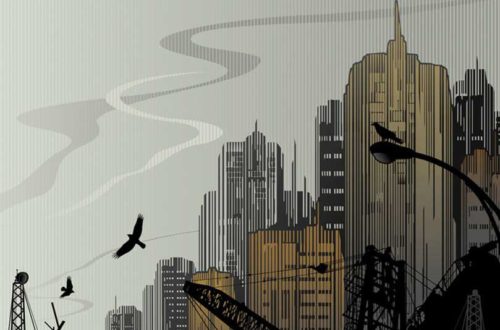Image: Cubes by Lernert & Sander
During the week, I work from home, sitting at the desk I’m sitting at now here in Berlin. I sit at this desk and work with information and communications. My work used to be fairly straightforward. I would make videos teaching people how to make things. Then I became a manager and now I spend less time actually making videos and more time helping other people make videos, and scheduling, budgeting and communicating communicating communicating. I sit in video calls, mostly listening, sometimes talking. I write hundreds of text based messages on Slack and a smaller number via email. A lot of what I do is a kind of communication tennis, people hit balls at me and I hit them back to them, or hit them on to someone else. I know it’s unseemly to complain about this, it’s a decidedly first world problem, and I’m lucky to have a good job. But disclaimers aside, I find this work exhausting. Much more exhausting than the work of making stuff. Partly this is because I’m an introvert and so dealing with other people in general is draining rather than invigorating, but I am communicating mostly through narrow, asynchronous text based channels, which are generally more comfortable for people like me. But still. I find myself tired at the end of the day, and I sometimes wonder why. What did I do? I sat in the chair and chatted and answered emails. This doesn’t seem tiring. But in my experience it is.
In contrast, a few days a month, usually on Saturdays when my kids are out of the house I do long a day of work on my own projects. Lately that has been working on my level generator Strata or my YouTube channel. I enjoy working on both, I direct my own work and it’s pretty low stress. It’s also deep, focused work. On those Saturdays I generally work from about 9AM until 9PM, with a nice break for lunch. At the end of these days, I do not feel tired in the way that I feel from my managing work. Why? I believe it’s because of the fractured nature of my attention during my weekday work, and the energy expended on frequently and rapidly switching contexts and responding to inbound requests. It’s rare during these days that I get to focus deeply on something. Usually it’s bouncing from one slack message, to email, to a google doc, to some distraction like Twitter or YouTube for a minute, and back around in a circle. Each of these context switches requires a kind of mental setup cost and drains my batteries. This is probably why I drink soooo much coffee during the day and why I feel so tired at the end.
There have been a number of good articles written about this by various programmers online (here’s one) and programming is one of those disciplines in which this is most pronounced. To use a non-computer metaphor, in cooking terms, this is like the mise en place of your mind. You want to have all of your ingredients prepared and laid out within reach before you turn on the heat. If you had to keep going back and forth to the pantry to get out the carrots each time you needed a handful of chopped carrots, you would waste a lot of energy. Having them chopped and ready on the counter means you can just grab them. Fundamentally this seems like a problem of organizing and sequencing tasks. But how do we do this when our job is to communicate with our colleagues? One thing I am frequently tempted to do is to turn off my inbound Slack messages for part of the day, and just check in once or twice a day. This might lead to more focus. I know Tim Ferriss in the past has advocated this with batch processing email, to respond once a day. In a way I think Slack has sort of made this problem worse because it has replaced email but also created an expectation of an instant response. Maybe we need to manage this expectation among our coworkers and establish clearer boundaries to preserve our mental space. I may give it a try and report back.





